

Articles
How Does A Weighted Blanket Help Anxiety
Modified: January 9, 2024
Discover the benefits of weighted blankets for anxiety relief in this informative article. Find out how they promote relaxation and better sleep.
(Many of the links in this article redirect to a specific reviewed product. Your purchase of these products through affiliate links helps to generate commission for Storables.com, at no extra cost. Learn more)
Introduction
Anxiety is a common mental health disorder that affects millions of people worldwide. It can manifest in various ways, including excessive worry, restlessness, irritability, and trouble sleeping. While there are various treatment options available, one innovative and effective approach in managing anxiety is the use of weighted blankets.
Weighted blankets, as the name suggests, are blankets filled with materials such as beads or pellets to provide a gentle, evenly distributed pressure across the body. This additional weight feels like a comforting hug, creating a sense of security and calmness. Weighted blankets have gained popularity in recent years for their ability to alleviate anxiety symptoms and promote relaxation and sleep.
In this article, we will explore the benefits of weighted blankets for anxiety, how they work, and their impact on individuals suffering from anxiety disorders. We will also discuss their potential benefits for those with sensory processing disorders and provide recommended guidelines for using weighted blankets.
So, if you’re curious about how a simple blanket can help ease anxiety and improve overall well-being, read on to uncover the science behind weighted blankets and their remarkable therapeutic effects.
Key Takeaways:
- Weighted blankets provide deep pressure stimulation, reducing anxiety and promoting relaxation by enhancing serotonin and melatonin levels. They offer a non-invasive and drug-free approach to managing anxiety symptoms and improving sleep quality.
- Weighted blankets create a sense of security and calmness, making them a valuable tool for individuals with anxiety and sensory processing disorders. Following recommended guidelines ensures safe and effective use for anxiety relief and sensory regulation.
Read more: How Does Chia Seeds Help Weight Loss
What is anxiety?
Anxiety is a natural response to stress or perceived threats. It is a feeling of unease, fear, or worry that can be triggered by various situations or events. While occasional anxiety is a normal part of life, excessive and persistent anxiety can significantly impact a person’s quality of life and functioning.
There are several types of anxiety disorders, including generalized anxiety disorder (GAD), social anxiety disorder, panic disorder, and specific phobias. Each type has its unique symptoms and triggers, but they all share the common characteristic of overwhelming and uncontrollable worry.
Individuals with anxiety disorders may experience a wide range of physical and psychological symptoms, such as racing heart, shortness of breath, sweating, restlessness, trouble concentrating, and difficulty sleeping. These symptoms can make it challenging to carry out daily activities, form and maintain relationships, and experience a sense of peace and calm.
Living with anxiety can be incredibly distressing, leading individuals to seek effective ways to manage their symptoms. While there are various treatment options available, such as therapy and medication, many people are turning to alternative methods for anxiety relief, including the use of weighted blankets.
Weighted blankets offer a non-invasive and drug-free approach to anxiety management. By providing deep pressure stimulation, these blankets can help individuals with anxiety experience a sense of calmness and relaxation, mitigating the overwhelming feelings associated with their condition.
Now that we have a better understanding of anxiety and its impact, let’s explore how weighted blankets can be a valuable tool in alleviating anxiety symptoms and improving overall well-being.
Understanding the benefits of weighted blankets
Weighted blankets have gained significant attention for their therapeutic benefits in managing anxiety and promoting relaxation. The following are some of the key advantages of using a weighted blanket:
- Anxiety reduction: The deep pressure stimulation provided by a weighted blanket helps calm the nervous system and reduce anxiety levels. The gentle, even pressure promotes the release of endorphins, which are natural chemicals in the body that help alleviate stress and improve mood.
- Sleep improvement: Many individuals with anxiety struggle with sleep problems. Weighted blankets can aid in improving sleep quality by creating a sense of security and comfort. The additional weight mimics the feeling of a hug, which can help relax the body and mind, promoting a more restful sleep.
- Mood enhancement: The deep pressure stimulation from a weighted blanket can stimulate the production of serotonin, a neurotransmitter that regulates mood. Serotonin helps promote feelings of happiness and well-being, making weighted blankets a potential mood-enhancing tool for individuals with anxiety.
- Stress reduction: The soothing effect of a weighted blanket can help reduce stress levels. The pressure applied by the blanket can trigger the release of oxytocin, a hormone associated with feelings of calmness and relaxation. Using a weighted blanket during stressful moments can provide a comforting and safe environment to cope with overwhelming situations.
- Sensory regulation: Weighted blankets are also beneficial for individuals with sensory processing disorders, such as autism or ADHD. The deep pressure stimulation can help regulate sensory input, providing a calming effect and promoting better focus and attention.
- Improved concentration: Anxiety can often impair concentration and cognitive function. By reducing anxiety levels and promoting relaxation, weighted blankets can help improve focus and attention, enhancing productivity and performance.
As you can see, weighted blankets offer a range of benefits for individuals with anxiety and other related conditions. These blankets provide a non-invasive and accessible method to soothe anxiety symptoms, improve sleep, and enhance overall well-being. In the next section, we will delve deeper into how weighted blankets work and their impact on anxiety management.
How does a weighted blanket work?
Weighted blankets work by providing deep pressure stimulation (DPS) to the body. The gentle weight of the blanket distributes pressure across the body, creating a sensation similar to being hugged or held. This pressure activates the body’s proprioceptive system, which helps regulate body awareness and movement.
When the body receives deep pressure, it triggers the release of neurotransmitters like serotonin and dopamine, which are associated with feelings of relaxation and happiness. Additionally, weighted blankets can decrease the production of cortisol, a stress hormone that is often elevated in individuals with anxiety.
The weight of the blanket is typically determined based on a person’s body weight, with experts recommending that the blanket should be around 10% of the individual’s body weight. However, the weight may vary depending on personal preferences and sensitivity to pressure.
The materials inside the weighted blankets, such as glass beads or plastic pellets, are evenly distributed in small pockets or compartments to ensure the weight is evenly distributed across the body. The construction of the blanket allows pressure to be applied uniformly, offering a comforting and consistent sensation.
It is important to note that weighted blankets should not be too heavy or cause discomfort. They should provide a gentle, calming pressure without restricting movement or causing any physical strain.
Overall, the deep pressure stimulation provided by a weighted blanket can help promote feelings of relaxation, reduce anxiety levels, and improve overall well-being. The next section will dive deeper into the impact of deep pressure stimulation on anxiety management.
Impact of deep pressure stimulation on anxiety
Deep pressure stimulation (DPS), which is the therapeutic technique used by weighted blankets, has shown significant benefits in managing anxiety symptoms. Here are some ways in which DPS impacts anxiety:
Calming the nervous system: Deep pressure stimulates the production of serotonin, a neurotransmitter that regulates mood and promotes a sense of calm and relaxation. Increased serotonin levels can help alleviate anxiety symptoms and create a sense of well-being.
Reducing stress and anxiety: Research suggests that deep pressure stimulation helps lower the production of cortisol, the stress hormone. By reducing cortisol levels, the body can better manage stress, leading to decreased anxiety and improved overall emotional well-being.
Promoting self-soothing: The gentle pressure applied by a weighted blanket mimics the sensation of being hugged or held. This tactile stimulation has a soothing effect on the nervous system and helps individuals self-soothe during times of anxiety or distress.
Distraction and grounding: When anxiety strikes, individuals often experience racing thoughts and difficulty focusing on the present moment. The deep pressure provided by a weighted blanket acts as a physical grounding technique, redirecting attention away from anxiety-inducing thoughts and bringing focus to the body’s sensations.
Regulating the autonomic nervous system: The autonomic nervous system plays a crucial role in regulating bodily functions and anxiety responses. Deep pressure stimulation can help balance the autonomic nervous system, leading to reduced anxiety symptoms and improved emotional equilibrium.
Improving sleep quality: Anxiety often disrupts sleep patterns and can lead to restless nights. The calming effect of weighted blankets can promote relaxation and produce a deeper, more restorative sleep. By improving sleep quality, individuals with anxiety can wake up feeling refreshed and better equipped to manage anxiety throughout the day.
These benefits highlight the positive impact that deep pressure stimulation, facilitated by weighted blankets, can have on managing anxiety. In the next section, we will explore how weighted blankets encourage relaxation and better sleep, further aiding in anxiety relief.
Read more: What Is A Weighted Blanket?
Encouraging relaxation and sleep
One of the significant benefits of using a weighted blanket is its ability to encourage relaxation and promote better sleep. Here’s how weighted blankets can help:
Deep pressure stimulation: The gentle weight of a weighted blanket provides deep pressure stimulation (DPS) to the body. This pressure activates the parasympathetic nervous system, promoting a state of relaxation and calmness. The soothing sensation created by the blanket mimics the feeling of being embraced or held, providing a comforting and secure environment.
Reducing anxiety and stress: Anxiety and stress often make it challenging to relax and fall asleep. The deep pressure stimulation from a weighted blanket helps reduce anxiety levels, promoting a sense of tranquility. By calming the nervous system, the blanket can alleviate racing thoughts and anxious feelings, allowing individuals to unwind and prepare for sleep.
Improving melatonin production: Melatonin is a hormone that regulates the sleep-wake cycle. Weighted blankets can help enhance melatonin production, thereby regulating the natural sleep-wake rhythm. This can be especially beneficial for individuals with anxiety-related sleep disturbances, allowing them to achieve a more restful and rejuvenating sleep.
Sensory relaxation: Weighted blankets can provide sensory relaxation for individuals who are hypersensitive or easily overwhelmed by sensory input. By offering a gentle and constant pressure, the blanket can help individuals filter out external sensory stimuli, creating a peaceful environment conducive to relaxation and sleep.
Promoting body awareness: The weight and pressure of the blanket can enhance body awareness, allowing individuals to better connect with their physical sensations. This increased awareness can help individuals identify and release tension, facilitating muscle relaxation and overall body comfort.
Enhancing sleep quality: When individuals are relaxed and less burdened by anxiety, they are more likely to experience improved sleep quality. The comforting and calming effect of a weighted blanket can help individuals maintain a deeper and more restorative sleep, leading to increased daytime functioning and a greater sense of overall well-being.
By encouraging relaxation and promoting better sleep, weighted blankets play a valuable role in assisting individuals with anxiety-related sleep challenges. In the next section, we will explore how weighted blankets promote a sense of security and calmness, which can be particularly beneficial for those with anxiety disorders.
When using a weighted blanket for anxiety, choose one that is about 10% of your body weight for the best results. This will provide the right amount of pressure to help calm your nervous system.
Promoting a sense of security and calmness
One of the key benefits of using a weighted blanket is its ability to promote a sense of security and calmness. Let’s explore how weighted blankets achieve this:
Emulating a hug: The gentle pressure from a weighted blanket replicates the sensation of a warm, comforting hug. This physical contact and sense of closeness can trigger the release of oxytocin, a hormone that promotes feelings of trust, relaxation, and overall well-being. The hugging-like effect of the blanket creates a safe and secure environment, helping to alleviate anxiety and enhance a sense of calm.
Reducing feelings of vulnerability: Anxiety often brings about feelings of vulnerability and unease. The weight and pressure provided by a weighted blanket can create a cocoon-like effect, creating a sense of protection and reducing feelings of vulnerability. This can be especially beneficial for individuals with anxiety disorders who may experience heightened sensitivity to their environment.
Enhancing self-soothing abilities: Weighted blankets can act as a self-soothing tool, offering individuals a tangible way to comfort themselves during moments of anxiety or distress. The tactile stimulation of the blanket’s weight can redirect focus from anxious thoughts to the physical sensation, promoting relaxation and a sense of control.
Creating boundaries and containment: Individuals with anxiety often struggle with racing thoughts and an overwhelming sense of chaos. The weight and pressure from a weighted blanket can provide a physical boundary, containing these racing thoughts and giving a sense of structure and order. This containment effect can provide a calming influence, helping to reduce anxiety and restore a sense of balance.
Stimulating the release of endorphins: Deep pressure stimulation from a weighted blanket triggers the release of endorphins, which are natural chemicals in the body known to reduce pain and promote a sense of relaxation and well-being. The increased levels of endorphins induced by the weighted blanket can soothe anxiety and contribute to an overall sense of calmness.
By promoting a sense of security and calmness, weighted blankets provide individuals with anxiety a comforting and safe space to unwind and recharge. In the next section, we will explore how weighted blankets can help enhance serotonin and melatonin levels, further benefiting those struggling with anxiety.
Enhancing serotonin and melatonin levels
Weighted blankets have the potential to enhance serotonin and melatonin levels, providing additional therapeutic benefits for individuals with anxiety. Here’s how weighted blankets can have a positive impact on these neurotransmitters:
Increasing serotonin production: Serotonin is a neurotransmitter that regulates mood, sleep, and overall well-being. Weighted blankets stimulate the production of serotonin in the brain, promoting feelings of happiness and relaxation. This increase in serotonin levels can help reduce anxiety and foster a more positive outlook.
Regulating melatonin production: Melatonin is a hormone that plays a crucial role in regulating the sleep-wake cycle. Weighted blankets can help regulate melatonin production, ensuring a balanced sleep-wake rhythm. Individuals with anxiety often experience disrupted sleep patterns, and the use of a weighted blanket can aid in restoring a more regular sleep schedule.
The deep pressure stimulation provided by weighted blankets triggers a cascade of physiological processes that influence the production and release of these neurotransmitters. By enhancing serotonin and melatonin levels, weighted blankets can contribute to a sense of calmness, improved mood, and better sleep quality.
It’s important to note that the benefits of weighted blankets on serotonin and melatonin are not solely limited to individuals with anxiety. Anyone who struggles with sleep difficulties or mood imbalances can potentially experience positive effects from using a weighted blanket.
In the next section, we will explore how weighted blankets can be beneficial for individuals with sensory processing disorder (SPD), a condition often coinciding with anxiety.
Addressing sensory processing disorder
Weighted blankets have shown to be beneficial for individuals with sensory processing disorder (SPD), a condition in which the brain has difficulty processing and responding to sensory stimuli. Here’s how weighted blankets can help address SPD:
Sensory regulation: Weighted blankets provide deep pressure stimulation that can help regulate and calm the sensory system. The gentle but firm pressure can assist individuals with SPD in processing sensory information more effectively, reducing sensory overload and promoting a calmer state of being.
Modulating sensory input: Individuals with SPD often experience hypersensitivity or hyposensitivity to sensory input, making it challenging to engage in daily activities. Weighted blankets offer a way to modulate sensory input, allowing individuals to filter out excessive stimuli or providing additional sensory input when needed.
Creating a calming space: Weighted blankets can create a safe and calming space for individuals with SPD. The deep pressure stimulation helps create a sense of security and comfort, allowing individuals to better cope with sensory challenges and reducing anxiety or distress associated with sensory overload.
Promoting self-regulation: The tactile stimulation provided by weighted blankets can help individuals with SPD self-regulate their sensory responses. The deep pressure stimulation can assist in organizing and integrating sensory information, leading to improved focus, attention, and overall sensory processing abilities.
Weighted blankets serve as a valuable tool in supporting individuals with SPD, helping them navigate and cope with sensory challenges in their daily lives. It is essential to work with healthcare professionals or occupational therapists to determine the most suitable weight and type of blanket for optimal benefits.
In the following section, we will provide recommended guidelines for using weighted blankets to ensure their safe and effective use.
Read more: How To Fix A Weighted Blanket
Recommended guidelines for using a weighted blanket
While weighted blankets can be highly effective in managing anxiety and providing sensory relief, it is important to follow recommended guidelines for their safe and effective use. Here are some guidelines to consider:
Consult with a healthcare professional: Before using a weighted blanket, especially if you have any underlying health conditions or concerns, it is advisable to consult with a healthcare professional. They can provide guidance on whether a weighted blanket is appropriate for you and help determine the most suitable weight and size.
Choose the appropriate weight: Weighted blankets should typically be around 10% of the individual’s body weight. However, this can vary depending on personal preferences and sensitivity to pressure. It is essential to choose a weight that feels comfortable and provides a gentle, calming pressure without causing any discomfort or restriction of movement.
Consider the size of the blanket: Weighted blankets come in various sizes. It is recommended to select a blanket that covers your body effectively while also allowing for some room to move comfortably. This ensures that the pressure is evenly distributed across your body and provides optimal relaxation and sensory stimulation.
Ensure proper positioning: When using a weighted blanket, it is important to position it on your body correctly. The weight should be evenly distributed, covering your torso and limbs. It is not recommended to place the weighted blanket over your head or neck, as this can cause discomfort and restrict breathing.
Supervise use: It may be helpful, especially in the beginning, to use a weighted blanket under the supervision of a caregiver or partner. They can ensure that the blanket is positioned correctly and provide assistance if needed. This is particularly important for individuals with mobility or cognitive limitations.
Use for the appropriate duration: Weighted blankets can be used during specific activities or periods, such as during relaxation or sleep. It is essential to use them for the appropriate duration. Some individuals may prefer to use them for shorter periods during activities like reading or watching television, while others may find them beneficial throughout the night for better sleep. Listen to your body and adjust the usage accordingly.
Clean and care for the blanket: Follow the manufacturer’s guidelines for cleaning and caring for the weighted blanket. Some blankets come with removable covers that can be easily laundered, while others may necessitate spot cleaning. Regularly maintaining the cleanliness of the blanket is important to maximize its benefits and ensure hygiene.
It’s important to note that while weighted blankets can be highly beneficial for many individuals, they may not be suitable for everyone. Individuals with respiratory problems, circulation issues, or difficulty moving the blanket independently should seek guidance from a healthcare professional before using a weighted blanket.
By adhering to these recommended guidelines, you can safely and effectively incorporate a weighted blanket into your anxiety management or sensory regulation routine. In the concluding section, we will summarize the key points discussed in this article.
Conclusion
Weighted blankets have emerged as a valuable tool in managing anxiety, promoting relaxation, and improving overall well-being. With their deep pressure stimulation, these blankets offer a non-invasive and drug-free approach to alleviate anxiety symptoms and provide sensory relief.
We explored the benefits of weighted blankets, ranging from anxiety reduction and sleep improvement to mood enhancement and stress reduction. The deep pressure stimulation provided by these blankets can have a significant impact on the autonomic nervous system, neurotransmitter production, and sensory regulation.
Weighted blankets not only encourage relaxation and better sleep but also foster a sense of security, calmness, and self-soothing. By promoting the release of endorphins and modulating the production of serotonin and melatonin, these blankets contribute to improved mood, reduced anxiety, and enhanced sleep quality.
Furthermore, weighted blankets offer valuable support for individuals with sensory processing disorder, helping them regulate sensory input, create a calming space, and enhance self-regulation abilities.
When using a weighted blanket, it is crucial to follow recommended guidelines, such as consulting with a healthcare professional, selecting the appropriate weight and size, positioning the blanket correctly, and ensuring proper care and maintenance.
Incorporating a weighted blanket into your anxiety management or sensory regulation routine can provide a tangible source of comfort, assisting in reducing anxiety, promoting relaxation, and improving overall well-being. However, it’s important to note that weighted blankets should not replace professional advice or treatment for anxiety or related conditions.
If you’re considering using a weighted blanket, it’s always best to seek guidance from a healthcare professional or occupational therapist to ensure its suitability for your specific needs and requirements.
Remember, weighted blankets are not a one-size-fits-all solution, but with careful consideration and proper usage, they can be a valuable tool in your journey towards managing anxiety, finding relaxation, and achieving a greater sense of calmness and well-being.
Frequently Asked Questions about How Does A Weighted Blanket Help Anxiety
Was this page helpful?
At Storables.com, we guarantee accurate and reliable information. Our content, validated by Expert Board Contributors, is crafted following stringent Editorial Policies. We're committed to providing you with well-researched, expert-backed insights for all your informational needs.
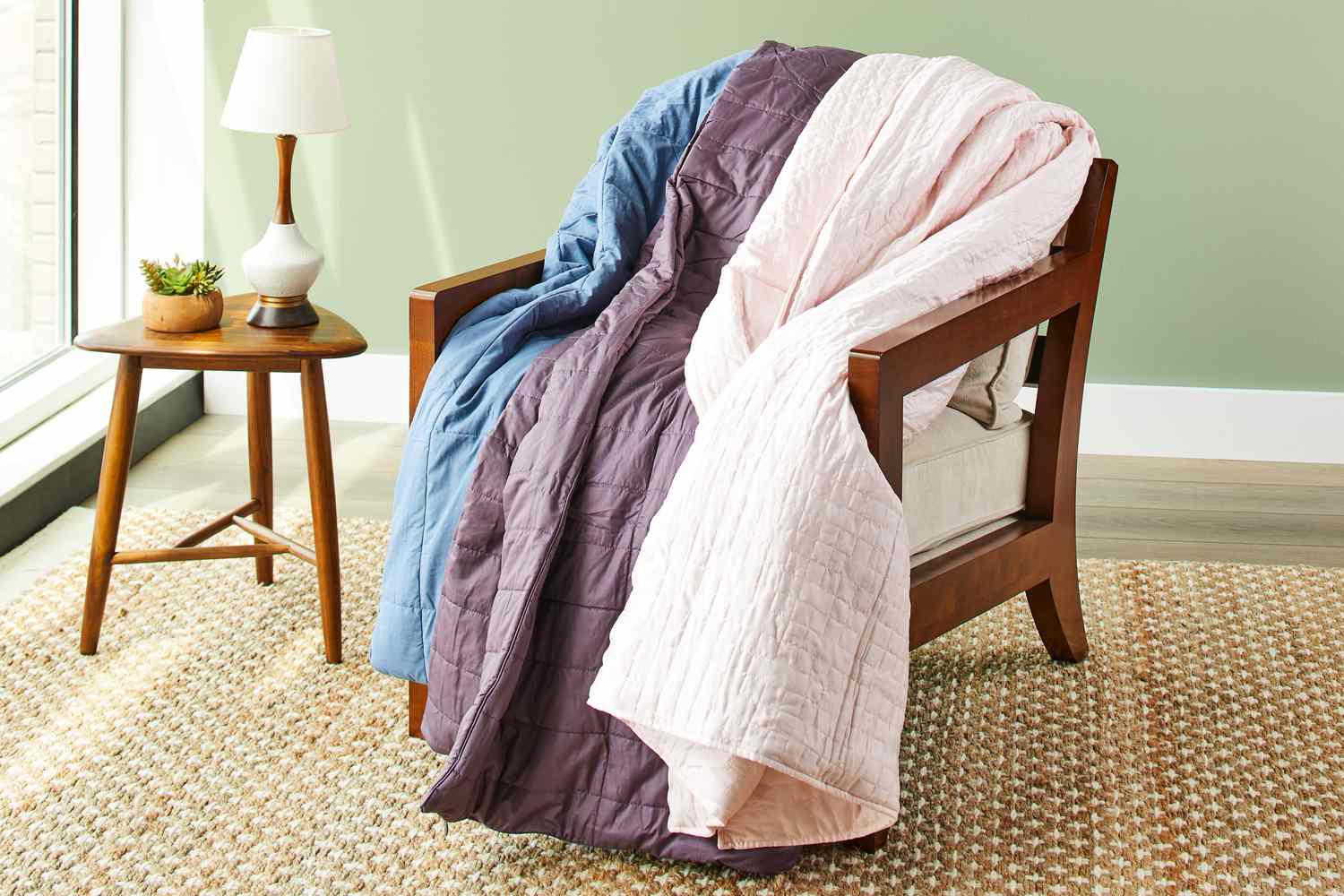
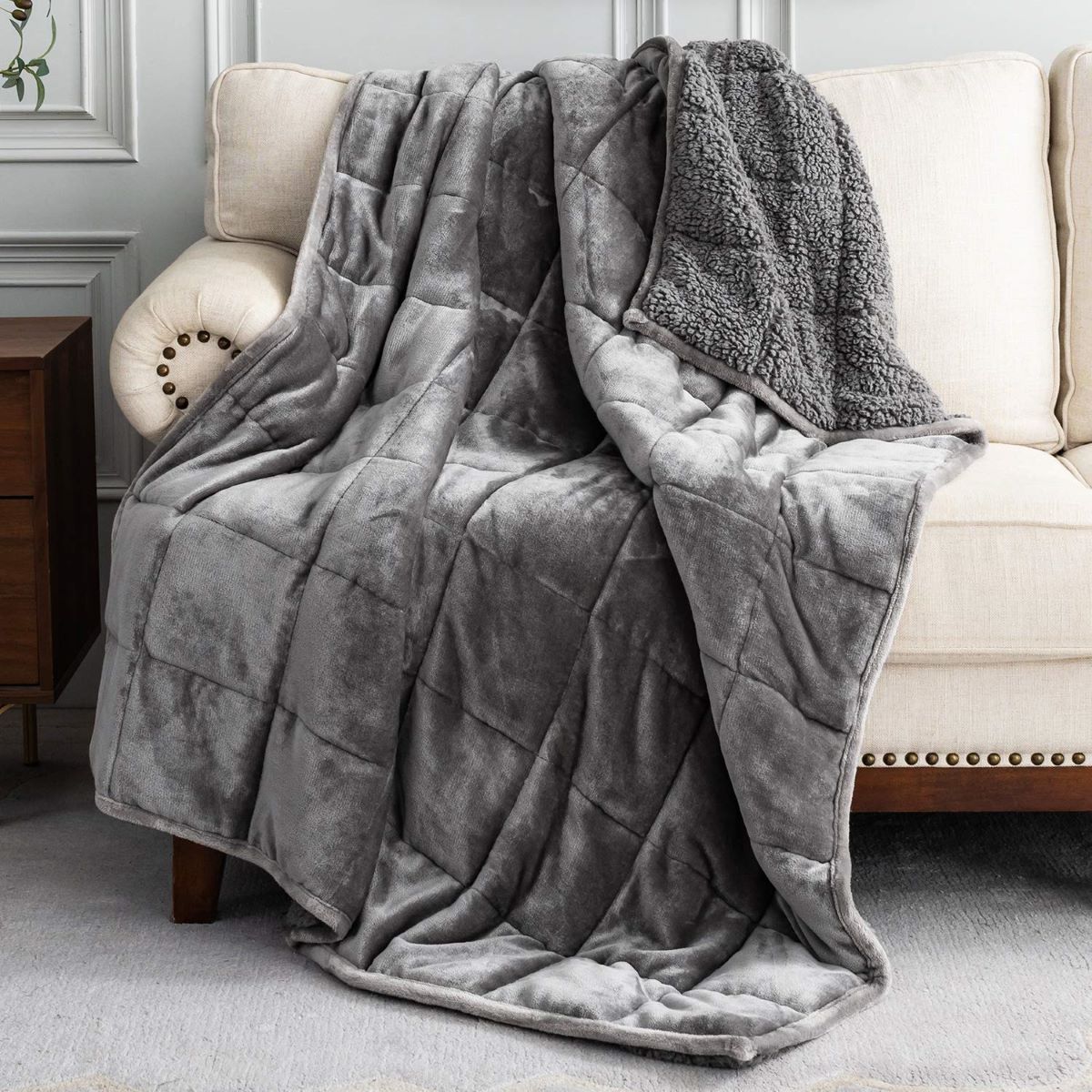
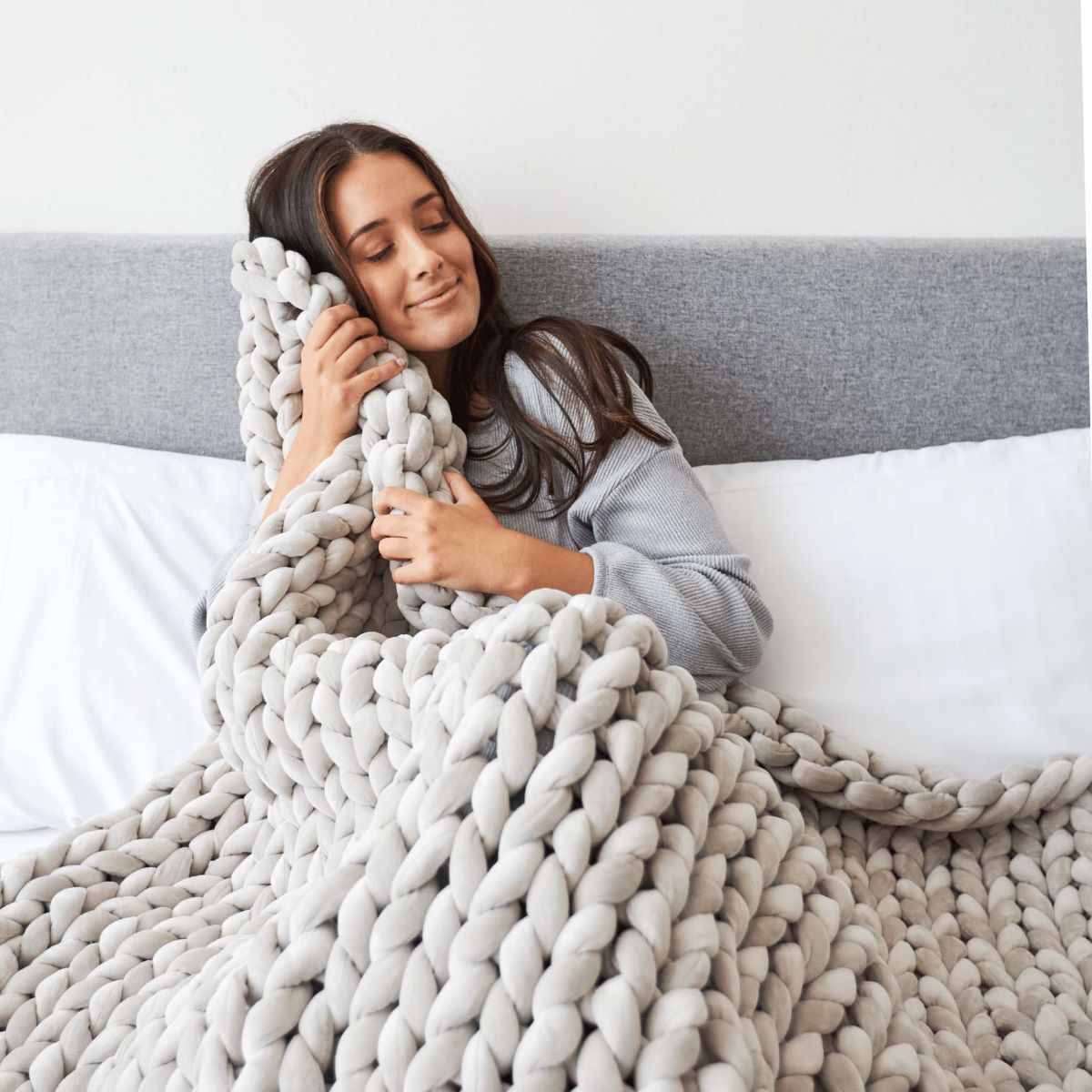
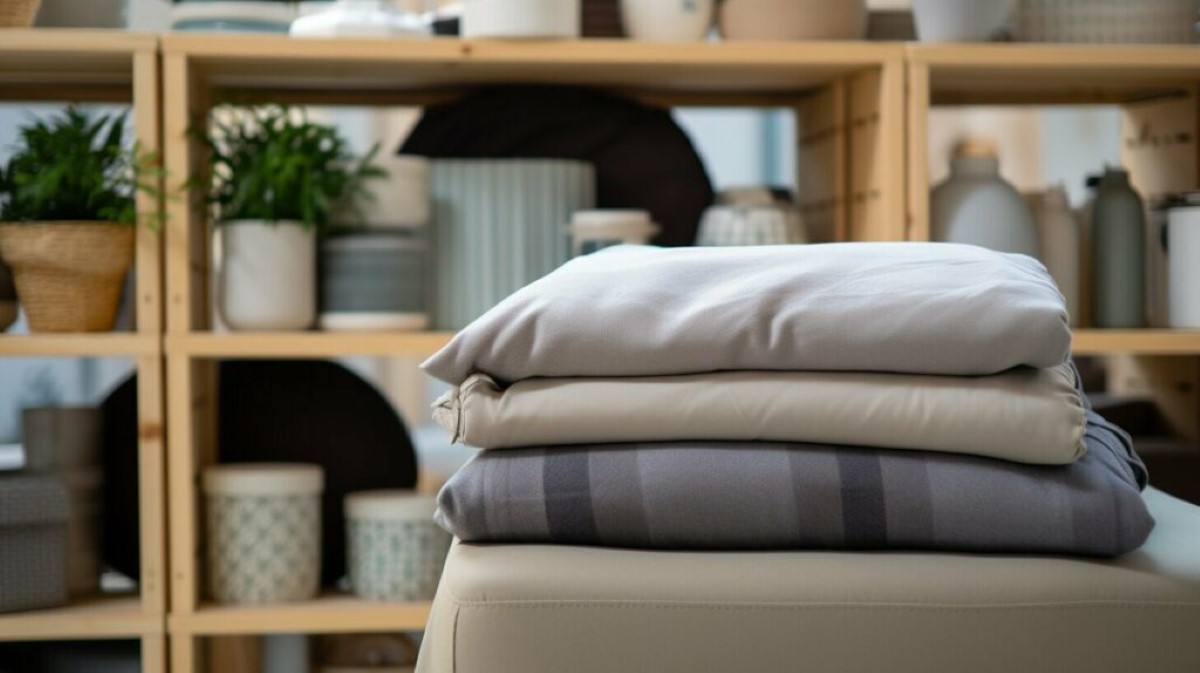

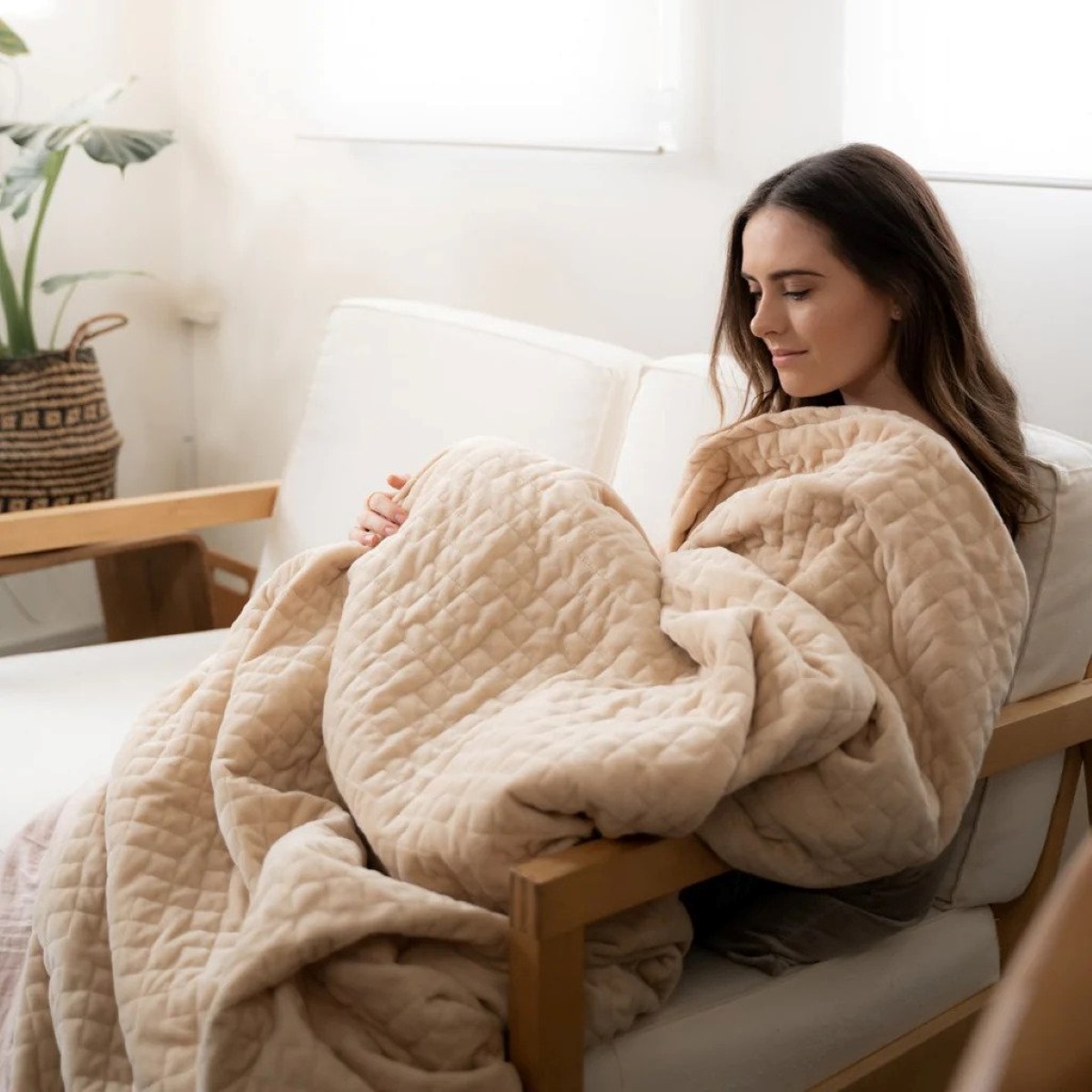
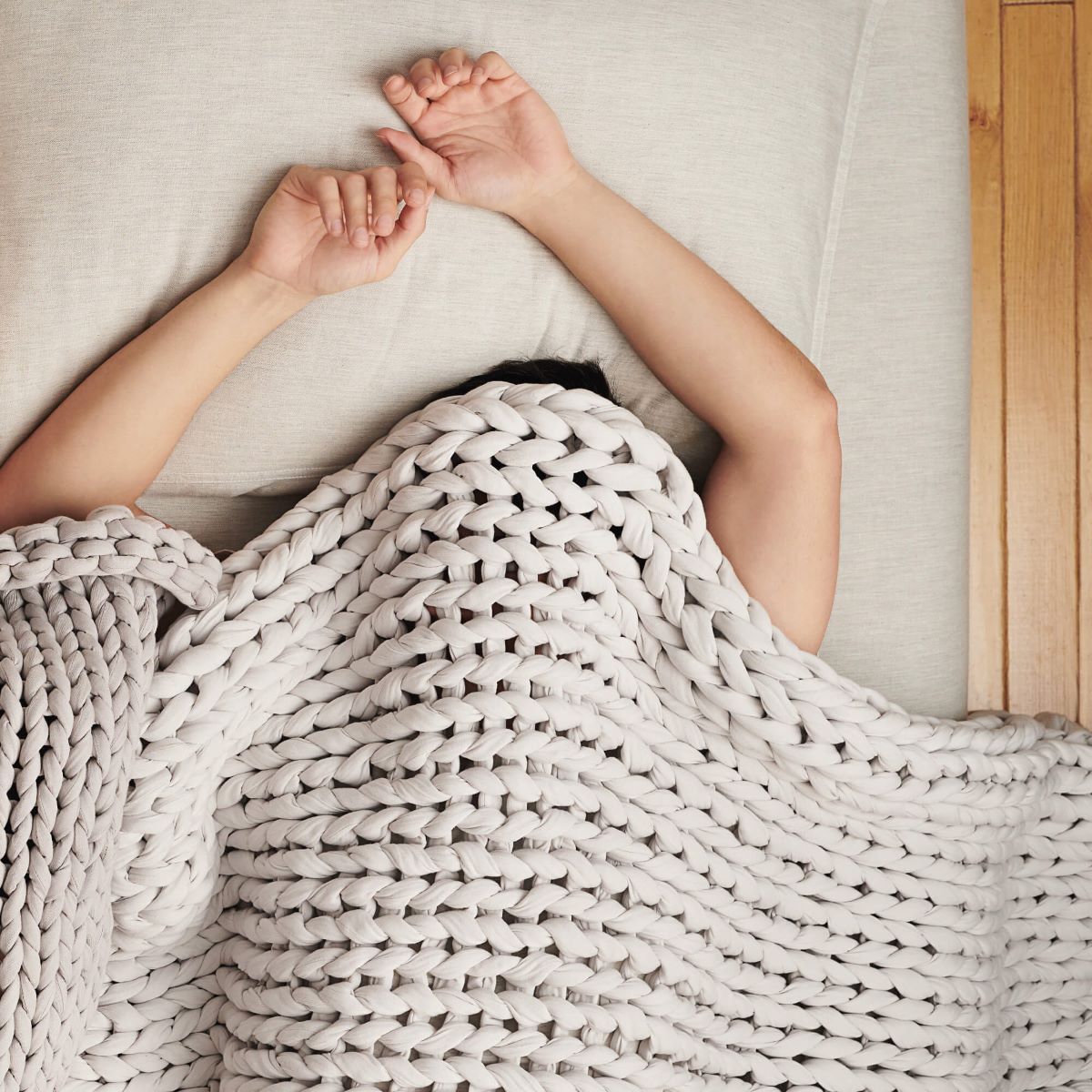
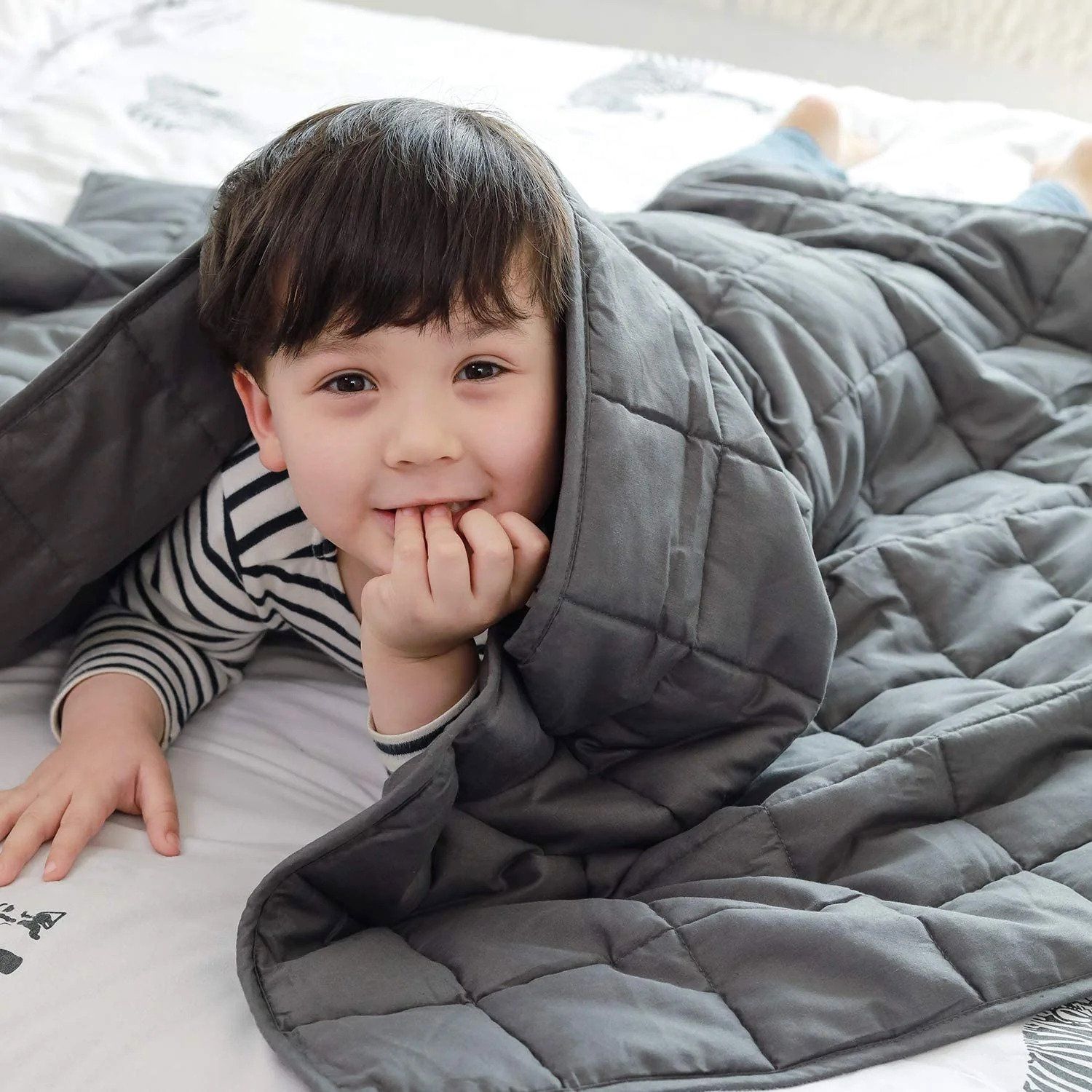

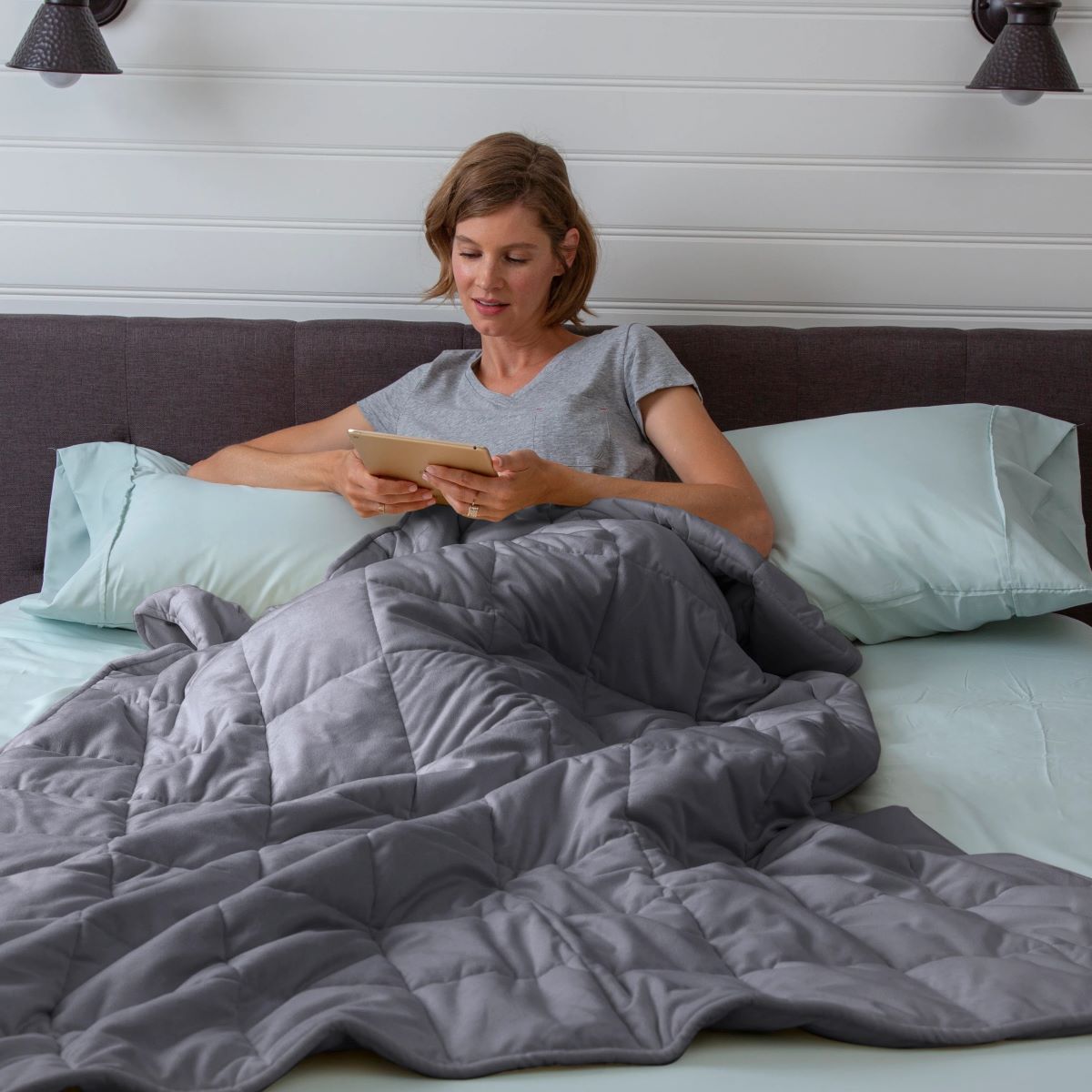
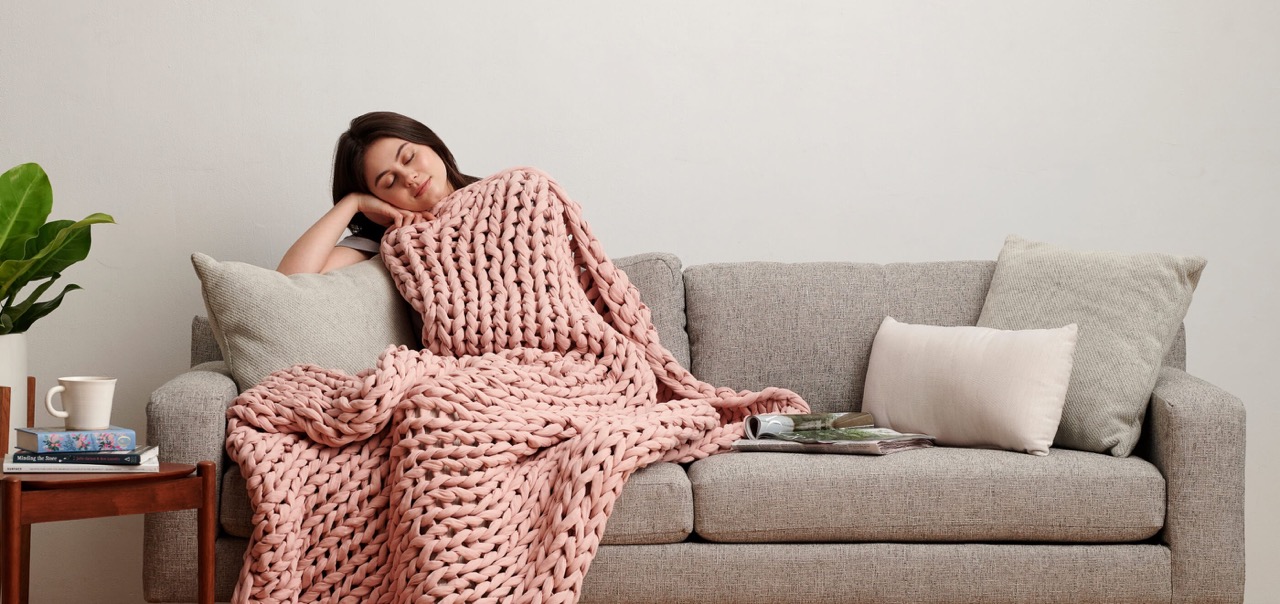

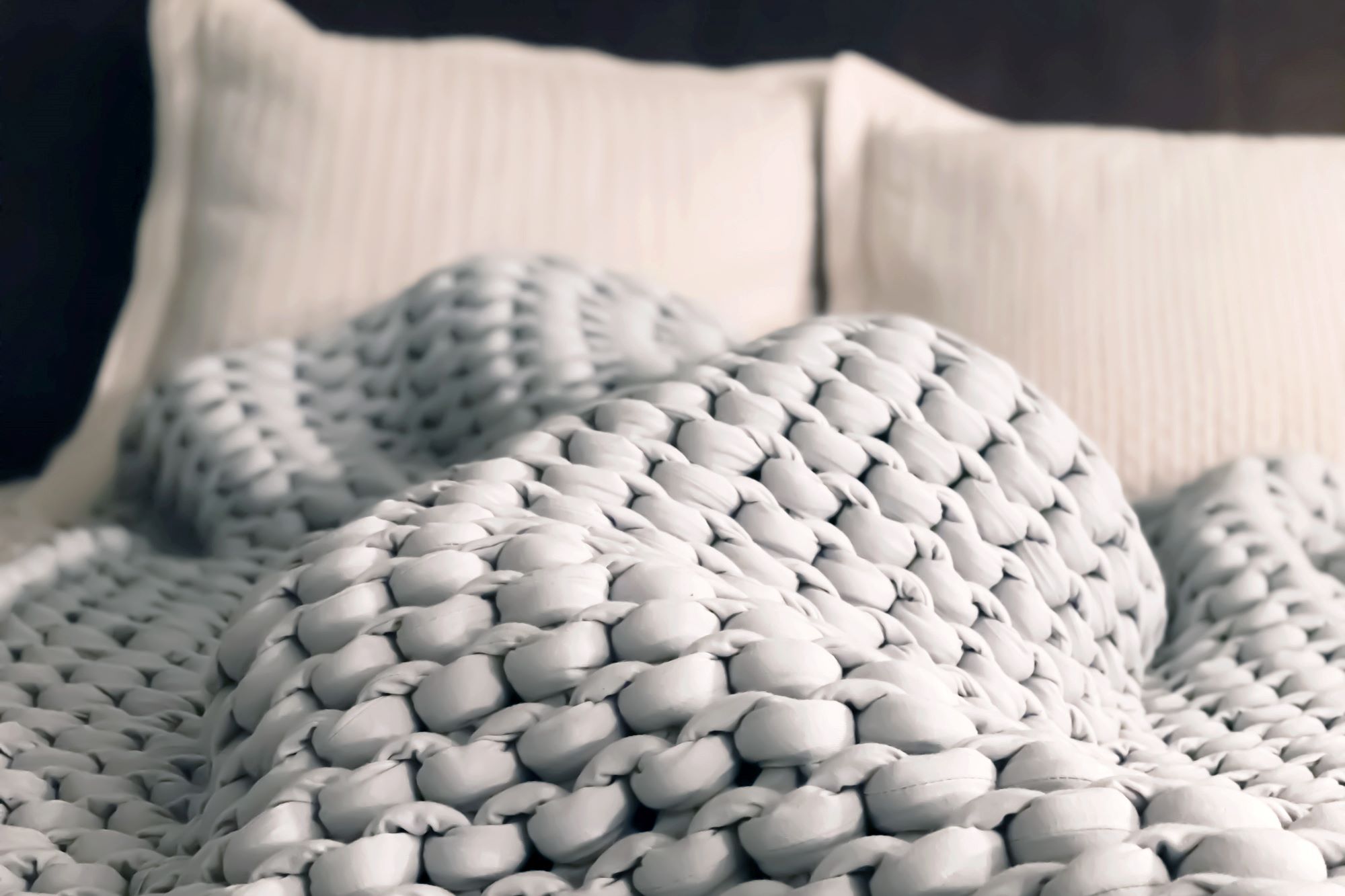

0 thoughts on “How Does A Weighted Blanket Help Anxiety”